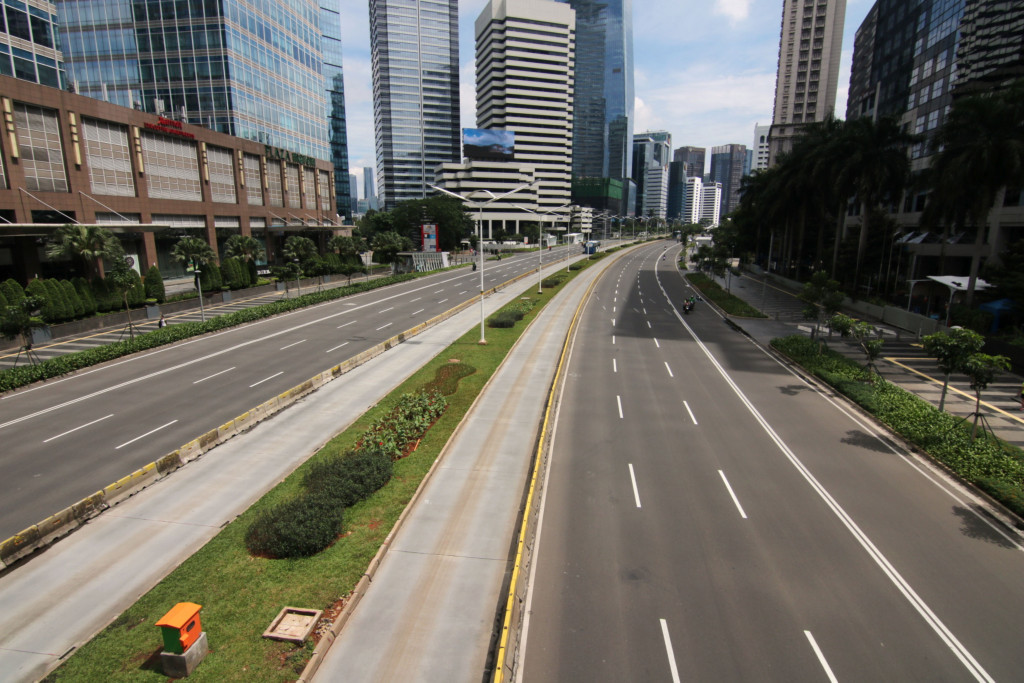Popular Reads
Top Results
Can't find what you're looking for?
View all search resultsPopular Reads
Top Results
Can't find what you're looking for?
View all search resultsPandemic helps reduce Jakarta’s traffic woes
The COVID-19 pandemic has helped put Jakarta outside the top ten list of the most congested cities around the globe.
Change text size
Gift Premium Articles
to Anyone
F
or the first time in years, Jakarta is not on the list of the most congested cities around the globe as a recent report mentions that the city shows improvements in untangling the traffic jams.
The 2020 TomTom Traffic Index, an annual report published by Dutch location technology company TomTom, ranks the Indonesian capital the 37th-most-congested city in the world. The city ranked 10th in the 2019 report.
The index shows that the average congestion level in Jakarta was 36 percent in 2020, down from 53 percent in the previous year.
Jakarta Transportation Agency head Syafrin Liputo was quick to present the result as an achievement of the city administration’s efforts to tackle congestion. He claimed that the provincial administration had taken several measures to solve the traffic problem, including the integration of public transportation systems through the JakLingko program.
But TomTom’s data suggest that COVID-19 restrictions played a bigger role in reducing traffic in the capital.
According to TomTom, the congestion level dropped significantly around mid-March, shortly after health authorities confirmed the first COVID-19 cases in Jakarta. At that time, the city administration and authorities had started to encourage people to work and study from home in order to reduce the risk of coronavirus transmission in the capital.
The least congested month for Jakarta in 2020 was April, coinciding with the first phase of large-scale social restrictions (PSBB) imposed by the authorities. TomTom recorded that the average congestion level reached 11 percent during the first PSBB period.
When the Jakarta administration eased the restrictions in early June, the congestion level rose to 26 percent. Governor Anies Baswedan said the move to ease the restrictions was necessary as the capital was suffering from an economic downturn.
Syafrin said the strict mobility restrictions due to the pandemic had also helped to reduce congestion.
Nirwono Joga, an urban development expert at Jakarta’s Trisakti University, said the administration still had tons of work to do to solve the traffic problem despite the increased rank in the annual index.
“People cannot travel due to the limited use of public and private transportation; thus, reducing traffic. There’s nothing special about this success,” Nirwono said.
Instead, he urged the Jakarta administration to use this opportunity for replanning mobility systems so that the city would avoid a relapse in terms of traffic congestion. For example, the city could rebuild populated kampungs and buildings into a liveable integrated areas with public facilities within walking or cycling distance.
“Another method is to apply an education zoning system and build adequate pedestrian areas and bicycle lanes, so that students can simply walk or cycle to school,” Nirwono went on to say.
During the COVID-19 pandemic, many Jakartans have shifted from personal motorized vehicles to bicycles. A global NGO that promotes sustainable transportation, the Institute for Transportation Development Policy (ITDP), recorded a tenfold increase in the number of cyclists along Jl. Sudirman in Central Jakarta during a morning rush hour in 2020 compared to the same period in the previous year.
To cater to the needs of the increasing number of cyclists, the transportation agency has built more bike lanes across the capital. It said it built about 63 kilometers of bicycle lanes in Jakarta’s business districts, such as along Jl. Sudirman and Jl. Thamrin.
The city hopes to have 500 km of bicycle lanes by 2030.
ITDP director Faela Sufa said the city administration should create sustainable innovation to maintain such traffic conditions after the pandemic. She added that the city should keep imposing policies that have proven effective in reducing traffic during the COVID-19 restrictions period.
“It would be a shame if we have to battle with congestion once we stop applying COVID-19 restrictions in the city,” Faela said.










